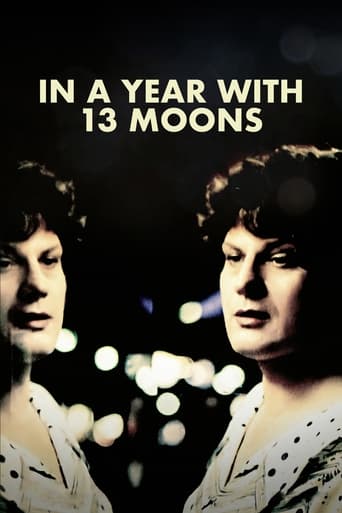cstotlar-1
As some others have written or implied this film is absolutely exhausting. It doesn't abandon its character or his life at any time although at times we almost WANT relief. Mahler's music in films has been dutifully noted. It can be almost as depressing in concert version. As for Nino Rota's "happy" music, or "life just continues (joyfully)" score, the irony isn't lost either. This is a one-man job and therefore takes risks that few producers or companies would tolerate under normal circumstances. I was profoundly moved by the film; I just don't plan to see it again for a while.Curtis Stotlar
hasosch
While "Depair. A Trip into the Light" (1977) shows the decrease of mind of Hermann Hermann, "In a Year of 13 Moons" illustrates the decrease of matter of Erwin/Elvira Weishaupt. Both persons try to change their identities: Hermann Hermann by taking over the identity of Felix Weber, Erwin Weishaupt by changing his sex and becoming Elvira. Both persons share their desire to transcend their personality by which action they trap themselves and get into a maelstrom of events out of which there is no other escape than insanity in the case of Hermann Hermann or death in the case of Erwin/Elvira. In both cases, despair may be seen as the causing motive of the process of self-destruction. "Despair is the only condition of life I can accept", director R.W. Fassbinder said in an interview. It seems as if each person is given a certain role, which he or she has to play and which displays this person's personality as perceived by society. Maybe everybody is surrounded by an infinite number of empty but already reserved personalities that will be taken by future persons. If somebody transcends his personality, he thus steals one that was already determined to someone else, an action by which the equilibrium of subjectivity in this world is disturbed and for which therefore a transcending person has to be punished. And the mechanisms of punishment work in the two forms of destruction or self-destruction, the latter possibility is enabled by guilt, a concept that transfers the position of the executor from the society to oneself. Moreover, once changed one's own personality, there is not return anymore. When Elvira cuts her hair and dresses again with men's clothes, he is not accepted anymore by his wife and his daughter as Erwin, although Elvira is still recognized as Erwin by Anton Saitz, for whom he once changed his sex. He/she is thus neither Erwin nor Elvira, thus both persons or somebody between both persons and therefore in any way taking the position of a third person, which again means transcendence and has to be punished by society which paradoxically turns out to be a strictly immanent concept of organization, while persons tend to be transcendental.
spazyouth
I found this movie difficult to watch the first time I saw it, and after the initial shock faded, I found myself drawn back into this tragic tale of a desperate human being. Elviras character has to be one of the most pitifully human in the history of cinema, and the recounting of her last few days alive are rife with powerful imagery ( especially the haunting slaughter-house scene...not for the weak of stomach! Vegans beware!) to convey an extraordinarily beautiful, heart-wrenching tale. The story is loosely based on one of Fassbinder's own lover who committed suicide, and perhaps it is that personal background that infuses the film with a palpable sense of reality... few films have felt more true to me than In a Year of 13 Moons. Fassbinder's approach in this film is a little different than in say, Ali: Fear Eats the Soul, there is less dialog, perhaps to convey the loneliness and hopelessness of Elvira in her final moments. The acting is superb, and the characters will stay with you long after you turn your TV off. I would recommend the Criterion edition for anyone interested in the film, its chock-cull of extra features, and a really cool introduction by Austin filmmaker Richard Linklater.
Igor-18
Fassbinder's genius is making you feel as trapped and desperate as Elvira, you really feel empathy for the character. Only the visit with her family is there a brief respite from her pain. Kudos for Fassbinder for his good taste in using Suicide's "Frankie Teardrop" on the soundtrack--a song about a man who feels trapped, but directs his anger outward, rather than inward, like Elvira.




